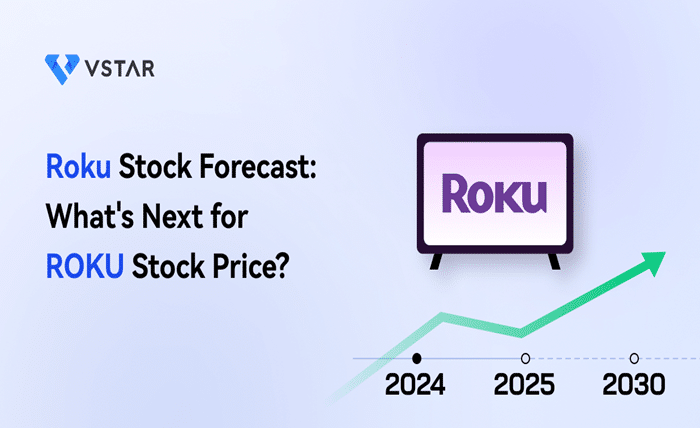Roku Stock Target Price: What Investors Need to Know

Roku Inc. has become one of the most talked-about companies in the streaming industry, thanks to its innovative products and services that have reshaped how consumers interact with television. However, investors often focus not only on Roku’s performance but also on its stock target price. This metric helps investors gauge whether the stock is undervalued or overvalued. In this article, we will explore the factors influencing Roku’s stock target price, analyze expert forecasts, and provide a clearer picture for potential investors.
What is Roku Stock Target Price?
The Roku stock target price is the projected value of Roku Inc.’s stock over a specific period, usually one year. Analysts and financial experts use various methods, including technical analysis, fundamental analysis, and market sentiment, to set a target price. The target price reflects their belief in the company’s future performance and growth potential. This figure is crucial for investors, as it helps them determine whether the stock is a good buy or if it’s priced too high.
Roku’s stock target price fluctuates based on various factors, such as the company’s earnings performance, the broader tech market trends, and competition within the streaming industry. For investors, tracking the target price can provide insights into potential gains or losses in the short to mid-term. Financial analysts typically adjust these target prices based on quarterly earnings, market news, and other influential factors.
Key Factors Influencing Roku Stock Target Price
Several elements influence the roku stock the most prominent of which are Roku’s business performance, industry trends, and macroeconomic factors. A company’s earnings reports can significantly impact its stock price targets, with positive earnings often leading to higher target prices and vice versa. As a company heavily reliant on advertising revenue and user growth, Roku’s ability to increase its active accounts and average revenue per user (ARPU) is a major driver.
Furthermore, competition in the streaming market affects investor sentiment and stock targets. With companies like Amazon, Apple, and Google investing heavily in their own streaming platforms, Roku must constantly innovate and expand its offerings to maintain market share. Additionally, macroeconomic factors such as inflation rates, interest rates, and global economic conditions can also play a crucial role in adjusting the Roku stock target price.
The Impact of Roku’s Financial Performance on Stock Target Price
Roku’s financial performance is perhaps the most significant factor in determining its stock target price. When Roku reports strong revenue growth, expanding user engagement, or better-than-expected profits, analysts typically raise their target price for the stock. Conversely, if the company reports weak earnings or misses market expectations, target prices may be adjusted downward.
For example, Roku’s advertising revenue, which contributes a substantial portion of its income, is a major indicator of the company’s financial health. A robust advertising performance often signals to investors that Roku’s business model is effective, which can result in higher stock targets. Additionally, Roku’s ability to expand into international markets, along with diversifying its revenue streams through hardware and partnerships, can also positively impact its financial performance and stock price targets.
Analyst Forecasts and Their Role in Roku Stock Target Price
When determining the Roku stock target price, analysts from major financial institutions often issue forecasts based on their research and expertise. These forecasts take into account various factors, such as market trends, company earnings, and competitive dynamics. Investors closely monitor these projections, as they can help inform decisions about whether to buy, hold, or sell Roku stock.
Analyst consensus on Roku’s stock target price is typically derived from the average of all the individual price targets set by analysts. While individual analysts may have differing views based on their research methods, the consensus target price offers a balanced perspective on the stock’s future potential. It’s important to note that these forecasts can change frequently, especially after quarterly earnings reports, new product launches, or changes in market conditions.
Read more about : however synonym
Roku’s Competitive Landscape and Its Effect on Stock Target Price
The streaming industry is highly competitive, and Roku’s stock target price is heavily influenced by its position relative to competitors like Amazon Fire TV, Apple TV, and Google Chromecast. Roku has managed to carve out a unique space by offering a user-friendly interface and supporting multiple streaming services across a range of devices. However, as competition intensifies, Roku’s ability to sustain its market share and differentiate itself from rivals is essential for its stock price target.
Investors often look at Roku’s competitive edge in terms of user acquisition, customer loyalty, and its expanding advertising business, which sets it apart from hardware-centric competitors. Analysts will factor in how well Roku is positioned to maintain and grow its competitive advantages when adjusting stock price targets. A successful strategic move, like a partnership with a major content provider or a new innovative feature, could lead to a positive revision of the stock’s target price.
The Role of Advertising Revenue in Roku’s Stock Target Price
As Roku generates a significant portion of its revenue from advertising, this segment plays a crucial role in determining its stock target price. The advertising business includes both display ads and video ads, which are shown to users across the Roku platform. The growth of Roku’s ad revenue is linked to its increasing number of active users and the engagement levels of its audience.
Roku’s ability to attract advertisers, increase its ad inventory, and grow its user base has a direct correlation with the company’s profitability. Financial analysts closely monitor these metrics when setting the Roku stock target price, and if ad revenues outperform expectations, it can result in a higher target price for the stock. Conversely, if the ad revenue growth slows down, analysts might lower their price targets.
Market Sentiment and How It Affects Roku Stock Target Price
Market sentiment plays an undeniable role in shaping Roku’s stock target price. Investor confidence in Roku, driven by broader market trends or specific news events, can lead to price swings that affect target price projections. When the stock market is performing well, and tech stocks are in demand, Roku’s stock price may rise, causing analysts to raise their target prices.
Conversely, during market downturns or periods of economic uncertainty, investors may become more risk-averse, causing the price of Roku’s stock to decline. The streaming industry, being heavily reliant on discretionary spending, is often seen as vulnerable during times of economic hardship, as consumers may cut back on subscriptions or entertainment-related expenses. These macroeconomic shifts can influence market sentiment and subsequently, Roku’s stock target price.
How to Analyze Roku Stock Target Price: A Step-by-Step Guide
Analyzing Roku’s stock target price involves understanding the various factors that influence its valuation. First, investors should look at the consensus target price provided by analysts. This figure represents the average of all analyst projections and provides an overall outlook for the stock.
Next, investors should consider the factors influencing Roku’s business, including user growth, advertising revenue, and product innovation. Examining Roku’s quarterly earnings reports, which outline the company’s performance in key areas, will also provide valuable insights. Lastly, staying updated on industry news, competitor movements, and economic conditions will help investors assess whether the current target price is realistic or needs adjustment.
By using these analytical tools, investors can make more informed decisions when considering Roku’s stock target price.
Is Roku Stock a Good Investment Based on Its Target Price?
With the volatile nature of the stock market, determining whether Roku stock is a good investment based on its target price requires a deeper understanding of the company’s growth potential, market conditions, and industry outlook. While some analysts may have a higher target price based on optimistic growth projections, others may issue a more cautious outlook based on increasing competition or market challenges.
For investors with a long-term perspective, Roku’s potential for growth in the global streaming market, expansion of its advertising revenue, and increasing user engagement may justify a higher target price. However, for short-term investors, monitoring quarterly earnings and adjusting strategies accordingly will be essential to take advantage of any price fluctuations.
The Future of Roku Stock and Target Price Expectations
The future of Roku’s stock target price depends on its ability to execute its business strategy and maintain its position as a leading player in the streaming industry. As the company continues to innovate, expand internationally, and capitalize on advertising revenue growth, analysts are likely to adjust their target prices upward.
However, investors must remain cautious about external factors such as competition, economic conditions, and potential regulatory changes. While Roku’s current performance is strong, its future growth potential is tied to a combination of strategic decisions and market conditions. Therefore, closely monitoring updates on Roku’s business and the streaming industry as a whole will help investors make more accurate predictions about its stock target price.
Conclusion
Roku’s stock target price is an important metric that reflects the company’s growth prospects and investor sentiment. Several factors influence this price, including Roku’s financial performance, competition, advertising revenue, and broader market trends. By understanding these dynamics and staying updated on market conditions, investors can make informed decisions about whether Roku is a good investment opportunity.
Though the stock market is inherently volatile, Roku’s unique position in the streaming industry and its increasing revenue streams offer strong growth potential. However, as with all investments, potential investors should consider their risk tolerance and long-term financial goals before making a decision.
FAQs
- What is Roku’s stock target price?
Roku’s stock target price is the forecasted value of its stock, calculated by analysts based on various financial and market factors. - How is Roku’s stock target price determined?
Analysts determine the target price based on Roku’s financial performance, market conditions, and competitive landscape. - Why does advertising revenue matter for Roku’s stock target price?
Roku generates significant income from advertising, and its ad revenue growth can positively influence its stock target price. - What factors can cause Roku’s stock target price to change?
Changes in Roku’s earnings, competition, user growth, and macroeconomic conditions can lead to revisions in its stock target price. - Is Roku stock a good investment?
While Roku offers growth potential in the streaming and advertising sectors, its stock target price should be assessed based on personal investment goals and risk tolerance.





